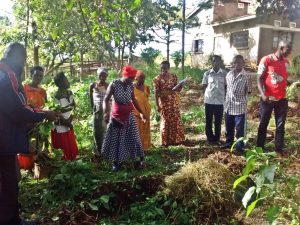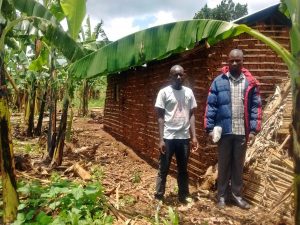This project is made possible through the partnership of WATER CHARITY and the NATIONAL PEACE CORPS ASSOCIATION. ![]()
Location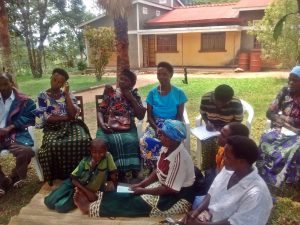
Kyomukama, Kyegegwa District, Uganda
Community Description
KWAYOG is a well-established VSLA that recently changed its name to include a focus on youth as well as women. This group exists in response to its overarching CBO, Unity Traders, Ltd. This organization owns around 300 acres of land and allows landless people (primarily women) to utilize pieces of land for agriculture until they earn enough capital to purchase their own. The group collects bi-monthly savings from its members and earns income from selling products like bananas, coffee, maize, tomatoes, and even juice and wine.
Problem Addressed
The problem that exists in the Kyomukama community is the same problem that all of Uganda currently struggles with, drought and the increasingly unpredictable weather patterns due to climate change.
Last year at this time, expected rain didn’t come. As a result, food shortages, price hikes, and even famine swept across the country, including the village of Kyomukama. Luckily the rains have come with a vengeance this year, but Ugandans are beginning to realize that they can no longer depend on the climate patterns they used to.
Project Description
The aim of this project is to implement a drip-irrigation system for the Kyomukama Women’s and Youth Group (KWAYOG) VSLA.
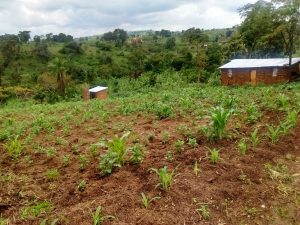 The system will run on gravity to utilize the rolling slopes of the region and save on costly engines that require fuel and maintenance. At least four systems will be purchased for the group of about fifty farmers to share on a rotating basis. One system includes a 500-1,000L water tank, about 1,000′ of drip tape, 100′ of T-line hose, ten hose connectors, and a filter.
The system will run on gravity to utilize the rolling slopes of the region and save on costly engines that require fuel and maintenance. At least four systems will be purchased for the group of about fifty farmers to share on a rotating basis. One system includes a 500-1,000L water tank, about 1,000′ of drip tape, 100′ of T-line hose, ten hose connectors, and a filter.
The plan is to collect water during the rainy season and utilize the system during the progressively longer dry seasons. More rain can also be collected through either lining holes with tarps or purchasing more tanks.
The impact will increase overall yield, produce quality, and harvest for home consumption, therefore, improving overall income and nutrition. It will also earn more income for the group by potentially making their products more competitive by availability during droughts.
The community is the driving force behind the project by putting a lot of work into project planning and seeking out something that could build the group’s capacity as well as mitigate the increasingly obvious challenge of drought as a result of climate change. The group is very serious about improving their livelihoods as farmers, and there are dozens of Perma gardens and compost piles implemented at village homes.
The implementation plan includes the purchase of tanks, hoses, filters, and any other necessary parts. The PCV, her counterpart, and two other members will arrange for equipment to be delivered to the village. A mandatory utilization training will then be conducted in which members will be required to attend in order for the systems to be used on their land. During that training, the first system will be set up at a chosen member’s land, to be decided in terms of activity, participation, and the vote of other members. Others will sign up to have their turn with a system on a rotating basis.
KWAYOG-beneficiaries will contribute over 25% in land, labor, storage, and one of the tanks.
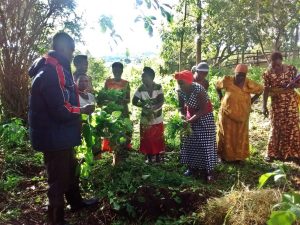 Project Impact
Project Impact
50 people will benefit from the project.
Peace Corps Volunteer Directing Project
Alexandra Rausch
Monitoring and Maintenance
The community will sustain the benefits of this project by sticking to their agreed-upon rotation of use list and by being vigilant in their rainwater harvest to make sure they collect enough for the coming drought. This will be driven by training on how to properly maintain the materials of the systems and store them during the rainy season when not in use.
Members will sign a form each time they use one of the systems to ensure it is in good working condition. The group has decided that if something breaks while in a member’s position, it is his/her responsibility to replace it.
Professional representatives from the provider will also come to train members on how to assemble/disassemble and store.
Comments
People all over the country are suffering from the effects of increasing drought and decreasing dependability on the rains. This project is a way to mitigate this challenge by addressing food security and access to proper nutrition, especially since nearly all members are women and mothers of breast-feeding age.
Project Funding
Although the funds to get this project underway have been provided by an anonymous donor, we continue to accept donations so that we will have funds on hand for the next project in Tanzania. Please use this Donate button, and your donation will be attributed to this project and the Peace Corps Volunteer will be notified.
